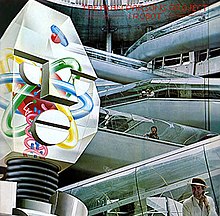I Robot (album)
| I Robot | ||||
|---|---|---|---|---|
 |
||||
| Studio album by The Alan Parsons Project | ||||
| Released | 1 June 1977 | |||
| Recorded | December 1976 – March 1977 | |||
| Studio | Abbey Road Studios, London, England | |||
| Genre | ||||
| Length | 41:05 | |||
| Label | Arista | |||
| Producer | Alan Parsons | |||
| The Alan Parsons Project chronology | ||||
|
||||
| Professional ratings | |
|---|---|
| Review scores | |
| Source | Rating |
| Allmusic | |
| Robert Christgau | (C) |
I Robot is the second studio album by the British progressive rock band The Alan Parsons Project, released on 1 June 1977 by Arista Records. The album draws conceptually on author Isaac Asimov's science fiction Robot trilogy, exploring philosophical themes regarding artificial intelligence. It was re-released on CD in 1984 and 2007.
The album was intended to be based on the I, Robot stories written by Asimov, and Eric Woolfson spoke with Asimov himself, who was enthusiastic about the idea. As the rights already had been granted to a TV/movie company, the album's title was altered slightly by removing the comma in "I,", and the theme and lyrics were made to be more generically about robots rather than to be specific to the Asimov universe. The cover inlay read: "I Robot... The story of the rise of the machine and the decline of man, which paradoxically coincided with his discovery of the wheel... and a warning that his brief dominance of this planet will probably end, because man tried to create robot in his own image." The title of the final track, "Genesis Ch.1 v.32," follows this theme by implying a continuation to the story of Creation, since the first chapter of Genesis only has 31 verses.
The album cover photo features the band members in the escalator tubes of the circular Terminal 1 building of the Charles de Gaulle Airport outside of Paris. Over this is superimposed a painting of a robot with a stylised atom for a brain. This illustration appears in a two-dimensional form on the label of the record. The original vinyl release had a gatefold-style cover; the inside spread had printed the lyrics for the non-instrumental selections and a monochrome photograph of Parsons himself.
Three singles were released from the album: "I Wouldn't Want to Be Like You", "Don't Let it Show" and "Day After Day (The Show Must Go On)." The LP track "Breakdown" went into heavy rotation on AOR stations and continues to be played on classic rock radio.
...
Wikipedia
